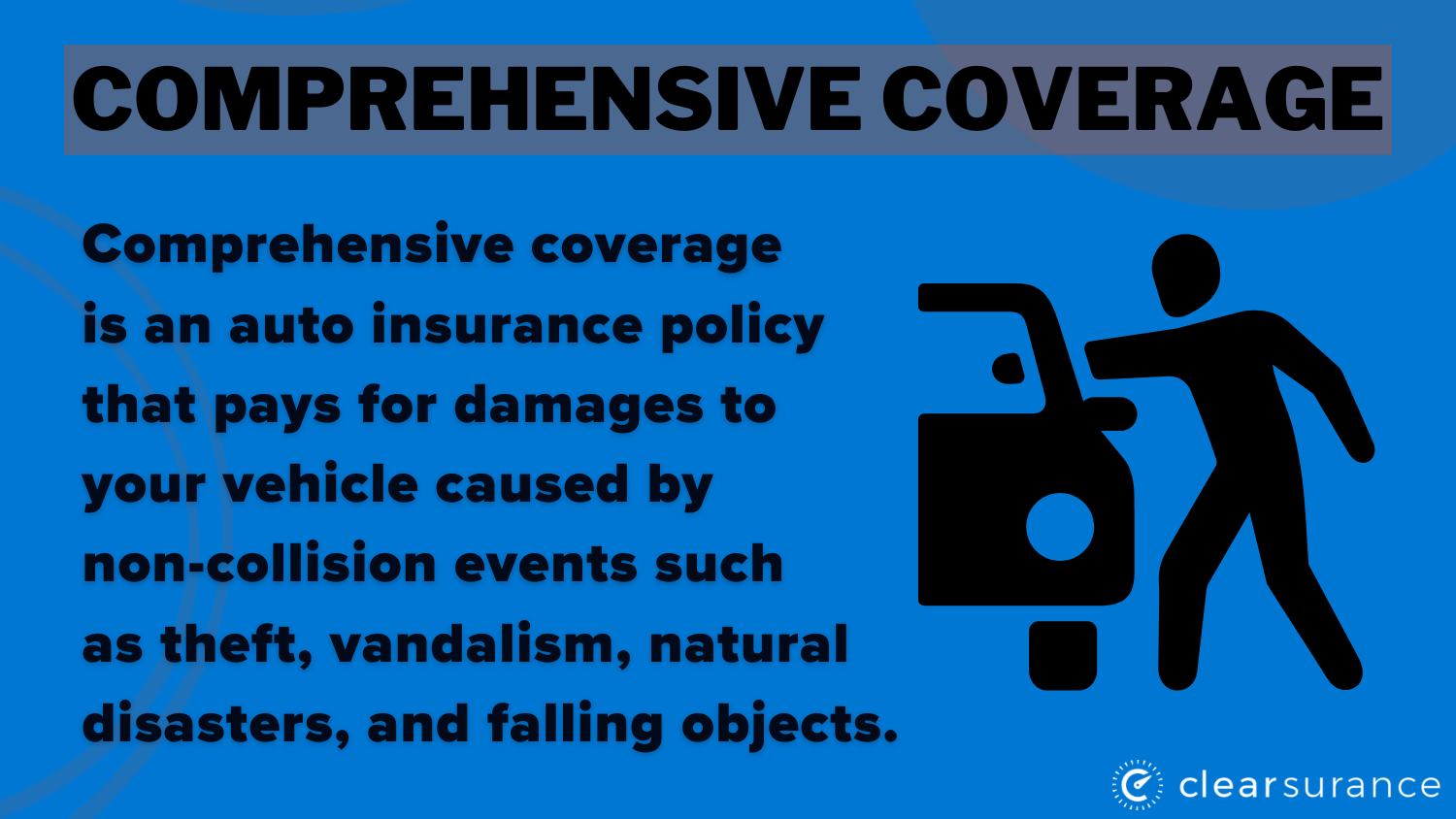
Comprehensive car insurance is a type of coverage that protects your vehicle from unexpected events outside of collisions.

Some events covered by comprehensive car insurance include things like fire, weather, animal contact, and falling objects. It also covers criminal acts against your vehicle, like theft and vandalism.
Read on to see comprehensive insurance examples and find out what type of car insurance you really need. Then, enter your ZIP to compare comprehensive car insurance quotes in your area.
What You Should Know
- Comprehensive insurance covers damage to your car from unexpected events
- No state requires comprehensive insurance coverage
- Drivers with a loan or lease on their vehicle usually need comprehensive
Understanding Comprehensive Car Insurance
Comprehensive car insurance is a type of auto insurance that covers damage to your vehicle that is not caused by a collision. All of the car insurance companies that customers recommend offer comprehensive insurance. It typically protects against events like:
- Weather-Related Damage: This includes damage from hail, floods, lightning, and hurricanes.
- Fire: If your vehicle is damaged or destroyed by fire, comprehensive insurance helps cover the loss.
- Falling Objects: Damage from things like tree branches, rocks, or debris is covered.
- Animal Collisions: If you hit an animal, such as a deer, comprehensive insurance covers the repairs.
- Glass Damage: Many policies include coverage for windshield or window damage.
Aside from these, comprehensive also protects against criminal acts performed against your car. If your car or parts of your car are stolen or damaged by vandalism, your comprehensive coverage would pay for repairs.
Comprehensive insurance is optional unless required by a lender or leasing company. It comes with a deductible, meaning you pay a set amount before your insurance covers the rest. While it doesn’t cover collision-related damage, it can be paired with collision coverage for more complete protection.
Like all types of insurance coverage, optional or mandatory, comprehensive has its limits on what it covers. Understanding what comprehensive car insurance covers can be difficult, but a representative from your provider can answer any questions you have.
An agent explains how comprehensive coverage helped replace a stolen catalytic converter: https://t.co/DykFan2R0Y pic.twitter.com/jJSV4qkX5L
— Allstate (@Allstate) January 15, 2017
An important thing to keep in mind about comprehensive coverage is that your policy won’t cover anything they find you responsible for. For example, your policy won’t pay for repairs if you damage your vehicle by throwing a rock at it.
Comprehensive Car Insurance Rates
For all that it covers, comprehensive car insurance is generally an affordable policy option. Although there are many factors that affect car insurance rates, comprehensive coverage is impacted by the same as any other policy type. Some of the most important factors are your age and gender.
Check below to see how much you might pay for comprehensive car insurance.
| Age | Female | Male |
|---|---|---|
| Age:16 | $320 | $350 |
| Age:18 | $260 | $280 |
| Age:25 | $190 | $200 |
| Age:35 | $140 | $150 |
| Age:45 | $120 | $130 |
| Age:55 | $100 | $110 |
Drivers often elect to purchase collision insurance with comprehensive for more thorough protection for their vehicle. Collision is usually more expensive than comprehensive, but not by much. Check below to compare comprehensive vs. collision insurance rates.
| Insurance Company | Comprehensive | Collision |
|---|---|---|
| $135 | $160 | |
| $130 | $150 | |
| $130 | $155 | |
| $120 | $140 | |
 |
$140 | $170 |
 |
$125 | $150 |
| $130 | $155 | |
| $125 | $145 | |
| $120 | $145 | |
| $110 | $130 |
As you can see, comprehensive insurance is usually affordable for most drivers. However, there are many reasons why car insurance is so expensive, so it's not unusual to see higher rates. You’ll need to compare rates with multiple companies to find the best rates for you. You can get a personalized quote by visiting the homepage of any insurance provider and filling out its request form.

Filling this form takes about 10 or 15 minutes and requires information like your driver’s license number and VIN. Repeat this process as many times as possible to compare rates. Alternatively, you can save time and effort by using a free online quote-generating tool.
Benefits of Comprehensive Car Insurance
Once you know the comprehensive coverage meaning, your next step should be to consider the pros and cons of buying a policy. Although comprehensive auto insurance coverage has a lot of benefits, it’s not for everyone.
To start, the benefits of comprehensive coverage include the following:
- Unexpected Costs: While you can avoid accidents with defensive driving techniques, some damaging events can’t be avoided. Comprehensive insurance offers protection against these events.
- Potential Savings: With coverage for a variety of incidents, comprehensive insurance can help you save a lot of money on car repairs.
- Required Coverage: If you have a loan or a lease, you might be required to purchase comprehensive insurance coverage to protect your new vehicle.
The best car insurance companies that cover car windows, weather damage, and other unexpected events can help you get the best policy for your car. Comprehensive auto insurance is a good choice for many people, but it may not be the most cost-effective choice for you. Consider the following disadvantages of comprehensive coverage before you sign up for a policy:
- Added Costs: Although comprehensive insurance costs are usually affordable, purchasing it will increase your overall monthly premium.
- Not Always Necessary: Drivers with newer, more valuable cars get the most benefit from comprehensive coverage. The cost of comprehensive isn’t usually worth it if you have an older vehicle.
Although it costs more per month, comprehensive coverage will save you money if your car is vandalized, stolen, or damaged by weather-related incidents. The potential to save thousands of dollars is usually worth the low cost of comprehensive insurance.
What Comprehensive Coverage Doesn't Cover
Not everyone needs comprehensive car insurance — in fact, many drivers find a liability car insurance policy is best. To decide if comprehensive is something you need, consider what this type of insurance doesn't cover:
- Property damage due to a collision
- Bodily injuries sustained by you and anyone else involved in the accident
Liability insurance covers property damage and bodily injuries. If you have collision insurance, this covers your property damage following a collision with another vehicle or object, such as a tree.
Full coverage vs. Comprehensive and Collision
Since they sound so similar, many drivers confuse full coverage and comprehensive insurance. However, there is a distinct difference.
Full coverage is a combination of coverage that offers complete financial protection in a variety of situations. It is made up of liability, collision, comprehensive, and uninsured/underinsured motorist insurance, depending on your location, so comprehensive alone is not full coverage.

On the other hand, collision and comprehensive insurance are two separate policy options. While full coverage includes comprehensive and collision insurance, it also includes other types of coverage.
Comprehensive Car Insurance Deductibles
A car insurance deductible is a fee paid to the insurance company to cover the cost of replacing or repairing a vehicle. This fee is subtracted from the payout amount and is often a minimum of $500.
Let’s say your car is vandalized, and after filing a claim with your insurance company, you find out the cost of repair is $2,500. You’ll pay a deductible of $500, then your insurance company pays you $2,000, which equals the cost of repairs minus the deductible.
If repair costs exceed the car’s value, or your car was destroyed, the vehicle is considered totaled by the insurance company.
Your insurer will issue a payout equal to the vehicle’s value minus the deductible. So, if your vehicle is valued at $8,000 and the deductible is $500, you’d receive $7,500.
In some cases, drivers can keep and repair the vehicle rather than salvage it. However, their insurance company may subtract the vehicle’s salvage value from the payout. Also, the insurance company can list the vehicle as salvage on the title, making it harder to buy auto insurance in the future since the car is considered undrivable unless it is repaired.
When to Drop Comprehensive Car Insurance
As your car’s value depreciates, you won’t need to buy as much comprehensive insurance, if any. Again, comprehensive insurance only covers up to the value of the vehicle, and if the value of the vehicle is too low, dropping this coverage can save you money.

Let’s take a look at an example. Say your vehicle’s value is $1,000, and your deductible is $1,000. Your insurance company would only pay you the value of your car, but since it equals the amount of your deductible, paying a $1000 deductible wouldn’t be necessary.
If you're ready to drop comprehensive car insurance, it's a good time to compare quotes from other companies to make sure you're getting a good price. Learning how to switch car insurance companies can help you save a significant amount when you're ready to change your policy.
Find the Best Comprehensive Car Insurance Quotes Today
Some drivers need protection beyond the state’s required liability insurance. Although comprehensive insurance is optional, it can save drivers thousands if their vehicle is damaged in a non-traffic related accident. Finding the best car insurance companies for comprehensive coverage is easy with a little research.
Even if you don’t believe your car will be stolen or crushed by a fallen tree, it might not hurt to purchase comprehensive coverage just in case. Enter your ZIP into our free comparison to find affordable comprehensive auto insurance near you.## Frequently Asked Questions
Do I need comprehensive insurance on an old car?
Owners of new, leased, or financed vehicles benefit from comprehensive insurance. Purchasing comprehensive insurance isn’t necessary for an older vehicle, but it depends on its value, the cost of insurance, and the deductible.
Does comprehensive insurance cover theft?
Figuring out if comprehensive covers theft is important, especially if you drive one of the top 10 most stolen cars in America. Yes, comprehensive insurance covers the cost of replacing a stolen vehicle; however, drivers will only be paid up to the value of the vehicle minus the deductible. So if a vehicle is worth $12,000 and the deductible is $1,000, the payout would be $11,000, which could be used to purchase a new vehicle.
How much comprehensive insurance do I need?
Comprehensive coverage does not have an assigned or pre-selected limit, and drivers don’t have the option to choose a limit. But comprehensive insurance will only cover up to the value of the vehicle. Rather than choosing a limit for this coverage, drivers have to choose a deductible they can afford in the event of an accident.
Can you just have comprehensive insurance?
No, comprehensive insurance cannot be purchased as stand-alone coverage. Drivers need to purchase the state minimum insurance coverage to purchase comprehensive insurance. And in most cases, comprehensive and collision insurance must be purchased together.
However, collision and comprehensive likely aren't enough coverage to legally drive in your state. The penalty for driving without car insurance is usually harsh, so make sure you have enough coverage.
Is it better to have collision or comprehensive insurance?
It depends on your needs—collision covers accidents with other vehicles or objects, while comprehensive covers non-collision events like theft or weather damage. If your car has significant value, having both offers the best protection.
At what point is comprehensive insurance not worth it?
Comprehensive insurance may not be worth it if your car’s value is low and the cost of coverage plus the deductible is close to or exceeds what you would receive in a payout. To update your policy with the right coverage, enter your ZIP to compare rates with as many companies as possible.
Can you drive any car with comprehensive insurance?
No, comprehensive insurance only covers the specific vehicle listed on your policy, not any car you drive. If you want coverage that protects you in any car you drive, you need non-owners insurance.
Is comprehensive insurance full coverage?
No, full coverage typically includes comprehensive, collision, and liability insurance, while comprehensive alone only covers non-collision damages.
How do you file a comprehensive claim?
Wondering when to file a car insurance claim? Contact your insurer, provide details of the incident, submit supporting documents (like photos or a police report), and follow their process for assessment and repair or payout. Remember, you’ll need to pay your comprehensive insurance deductible.
How much does comprehensive insurance cost?
The cost varies based on factors like your car’s value, location, and deductible, but average rates start at $100 per month. There are plenty of ways customers save money on their car insurance, so make sure to shop around to find the best comprehensive car insurance rates.







